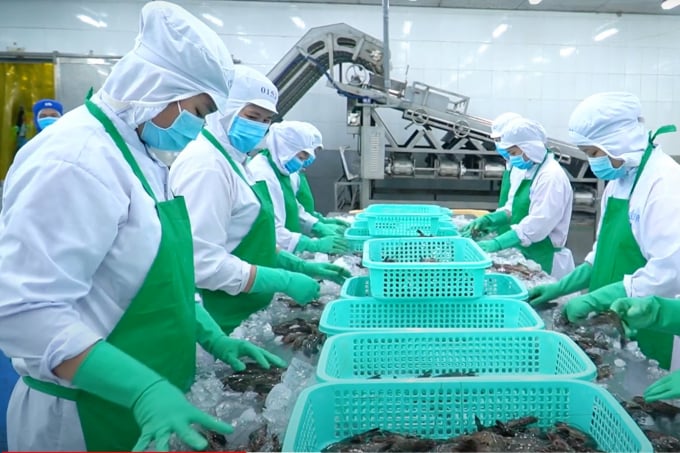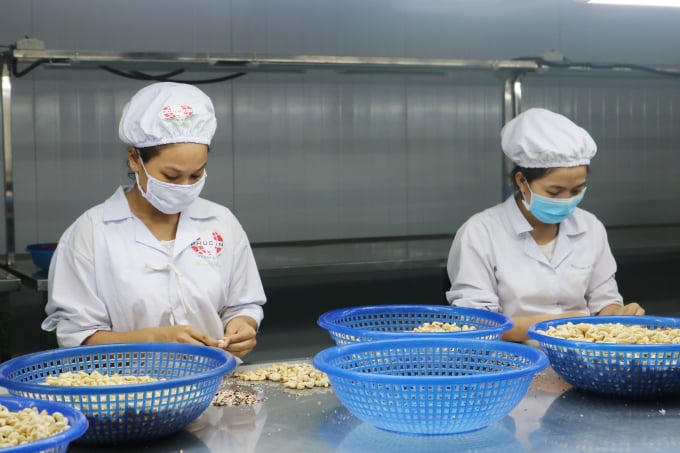June 18, 2025 | 04:08 GMT +7
June 18, 2025 | 04:08 GMT +7
Hotline: 0913.378.918
June 18, 2025 | 04:08 GMT +7
Hotline: 0913.378.918

Shrimps are being processed for export. Shrimp is the key agricultural product that Vietnam is exporting to Switzerland. Photo: Thanh Son.
According to Nguyen Duc Thuong, Commercial Counselor at Vietnam Trade Office in Switzerland, in recent years, economic and trade relations between Vietnam and Switzerland have developed positively.
The legal bases in economic and trade relations between Vietnam and Switzerland has been relatively complete. The two countries have signed an investment protection agreement, an agreement to avoid double taxation, an agreement on the protection of intellectual property rights, etc. These are important legal bases that allow businesses of the two countries to promote business cooperation.
Switzerland's import and export management mechanism as well as technical standards and product quality requirements are very similar to those of the EU. There is one more important factor that Switzerland still offers Vietnam the Generalized System of Preferences (GSP) when exporting goods to Swiss market with reduced tariffs.
The two-ways trade relations between Vietnam and Switzerland are growing quite well. According to data from Swiss Customs, the total import-export turnover between the two countries increased from US$ 1.53 billion in 2015 to US$ 2.407 billion in 2021. Vietnam has always maintained a trade surplus to the Swiss market.
The structure of Vietnam's export products to Switzerland is also constantly expanding. The number of groups of goods exported to Switzerland under the HS code has increased from 80 groups in 2015 to 92 groups in 2021.

A cashew nut processing factory for export in Binh Phuoc. Photo: Tran Trung.
In 2021, the export turnover of agricultural products and foodstuffs to the Swiss market reached US$ 143.2 million. Vietnam's agricultural and food exports to Switzerland were mainly seafood (US$ 56.1 million), coffee (US$ 29.8 million), processed foods (US$ 22.6 million), cashews nut (US$ 15.8 million), etc. There are still many potential rooms for growth in export turnover of Vietnam's agricultural products and foodstuffs to Switzerland.
According to Nguyen Thi Thuc, Chairwoman of the Vietnam - Swiss Business Gateway, Switzerland is a country with a high level of agricultural protection, especially for commodities such as meat, milk and dairy products, some kinds of vegetable. However, Vietnam's key export agricultural products do not compete directly with protected agricultural products in Switzerland.
“Two large supermarket chains, MIGROS and COOP, currently provide 65% of foodstuffs in Switzerland,” says Ms. Thuc. In addition to supermarkets with the main target to Swiss, there are also many supermarkets serving Asian immigrants. However, whether in supermarkets serving local people or supermarkets targeting Asian consumers, Vietnamese agricultural products and food are still scarce.
Meanwhile, in supermarkets in Switzerland, there are already presence of many processed foods from other Asian countries, especially from Thailand. Vietnam also has the strength to produce these foods such as fish sauce, soy sauce, dried fruit, etc.
In reality, there are some kinds of processed foods being sold at Swiss supermarkets with only Vietnamese printed on package, but its origin is Thailand. These foods might serve the Vietnamese community living in Switzerland. Some other kinds are Thai products, but the origin of processed materials is from Vietnam.
That is the reason why Ms. Thuc believes businesses need to invest more in deep processing in order to bring Vietnamese agricultural products and foods to Switzerland and compete in this market.
“If you export fresh agricultural products by air to Switzerland, the costs are very high, making the goods to Switzerland unable to be sold. And if fresh agricultural products are exported via sea, the transportation time is long (because Switzerland is located deep in the continent, there is no coast), it will make the goods easily damaged. As for agricultural products and foods are deeply processed, it is possible to bring to Switzerland by sea thanks to their long preservation time,” says Thuc.
Understanding the features of the Swiss market, many Vietnamese businesses are promoting deep processing of shrimp, tra fish (pangasius), coffee, cashew nut, etc., while focusing on designing appropriate labels and packaging in accordance with with Swiss regulations as well as the tastes of this country's consumers.
In addition, businesses also focus on obtaining certifications of high standards for each agricultural product, in order to meet the very high requirements of the Swiss market.
FACTS:
Switzerland's cashew imports increased by an average of 13.6 percent per year in volume and 12.9 percent per year in value between 2016 and 2020, from 1.9 thousand tons worth USD 18.98 million in 2016 to 3.12 thousand tons worth USD 28.24 million in 2020, according to the International Trade Center (ITC).
This means that Switzerland's cashew imports from Vietnam increased by an average of 20.4 percent in volume and 19.8 percent in value each year, from 742 tons worth USD 7 million in 2016 to approximately 1.500 tons worth USD 12.33 million in 2020.
Vietnam's cashew nut market share in total Swiss imports rose to 53.16 percent interannually from 38.58 percent in the first six months of 2020. As a result, Vietnam's cashew nut has a significant competitive edge in the Swiss market.
Translated by Duc Thuan
/2025/06/17/2344-1-131758_261.jpg)
(VAN) Amid tariff risks and growing trade barriers in the U.S. market, Australia is emerging as a promising destination to sustain the growth momentum of Vietnam's shrimp exports.
/2025/06/17/2013-1-nongnghiep-112009.jpg)
(VAN) This notable growth trend reflects the global taste for fresh, nutritious fruits and the expanding use of lychees across various sectors.

(VAN) The political and cultural insulation of Japan’s beloved grain is falling apart, and experts warn the country’s relationship with the staple will have to adapt.

(VAN) Noting risks, report examines impacts of avian influenza, changing trade patterns since 2022, fish fraud, and shipping industry’s net-zero goals.

(VAN) Mr. Tran Quang Bao, General Director of the Forestry and Forest Protection Department, met and worked with the International Wood Products Association to promote cooperation in the field of timber trade.

(VAN) China's outbound shipments of rare earths in May jumped 23% on the month to their highest in a year, though Beijing's export curbs on some of the critical minerals halted some overseas sales.

(VAN) To sustain capital flow, administrative reform alone is not enough; what farmers truly need is an ecosystem where both government and businesses grow together in support.